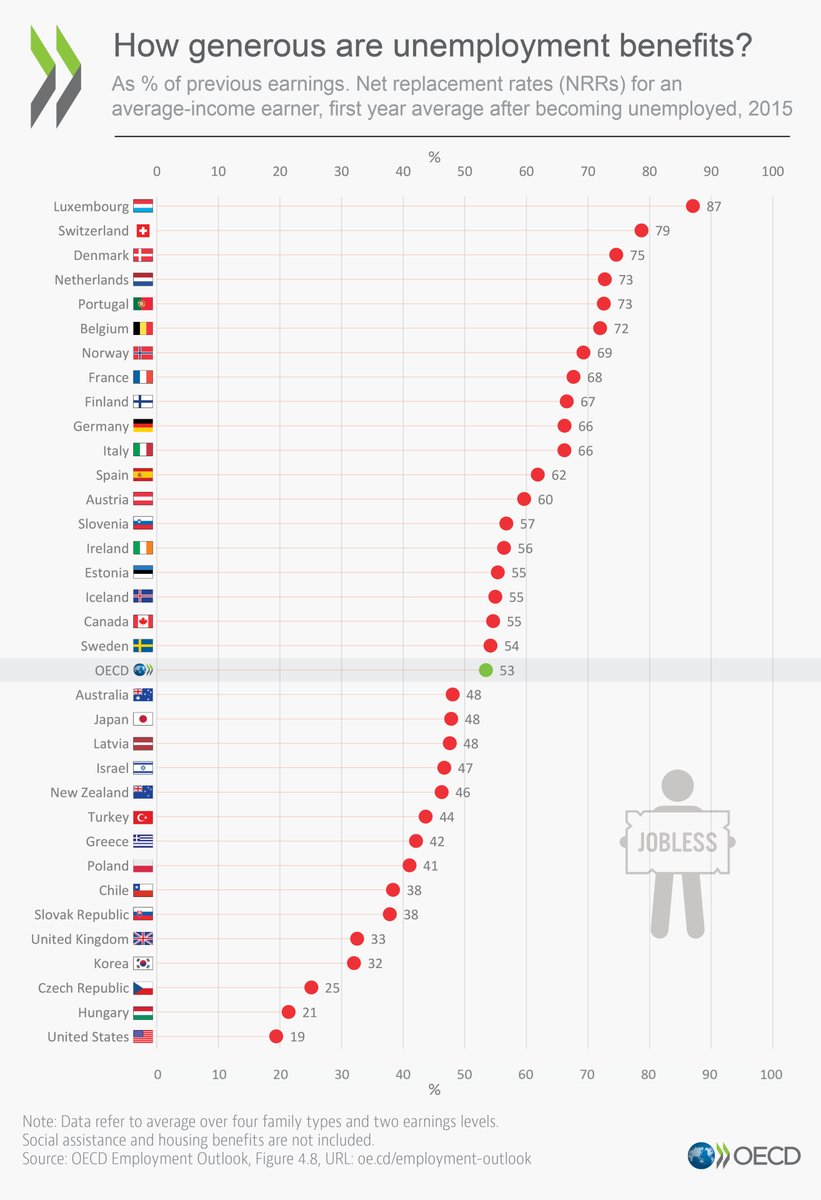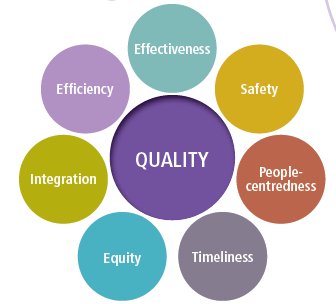Tweets
- Tweets, current page.
- Tweets & replies
- Media
You blocked @OECD_Social
Are you sure you want to view these Tweets? Viewing Tweets won't unblock @OECD_Social
-
OECD Social Retweeted
How generous are
#unemployment benefits? Compare your country’s#benefits as a % of previous earnings http://bit.ly/2lVeeDL
http://bit.ly/2lVeeDL #OECDinclusivepic.twitter.com/vECJHG6YRO Thanks. Twitter will use this info to make your timeline better. UndoUndo
Thanks. Twitter will use this info to make your timeline better. UndoUndo -
OECD Social Retweeted
The motherhood penalty for careers is undeniable, but some countries see more
#women come back to work than others. http://bit.ly/2KuUzsW#OECDInclusive#Jobs@OECD_Socialpic.twitter.com/FPkNkI66Xi Thanks. Twitter will use this info to make your timeline better. UndoUndo
Thanks. Twitter will use this info to make your timeline better. UndoUndo -
Poor quality health care is costly and wastes significant resources. Up to 15% of hospital budgets are devoted to rectifying substandard care
#HealthCareQuality http://bit.ly/2NqKCdOThanks. Twitter will use this info to make your timeline better. UndoUndo -
What has happened to
#Wages? OECD's@stescarpetta highlights three core factors hindering#WageGrowth http://bit.ly/2lYLaep pic.twitter.com/v64uob8WHl
http://bit.ly/2lYLaep pic.twitter.com/v64uob8WHl Thanks. Twitter will use this info to make your timeline better. UndoUndo
Thanks. Twitter will use this info to make your timeline better. UndoUndo -
OECD Social Retweeted
Delivering quality health services is a global imperative for achieving Universal Healthcare Coverage
#UHC#HealthForAll@jeremyveillard@OECD_Social@WBG_Health@WHO@etkelley419@NejadSepideh https://blogs.bmj.com/bmj/2018/07/05/universal-quality-healthcare-coverage-a-commitment-to-building-a-healthier-and-more-productive-society/ …pic.twitter.com/OSTs9wVOJA Thanks. Twitter will use this info to make your timeline better. UndoUndo
Thanks. Twitter will use this info to make your timeline better. UndoUndo -
OECD Social Retweeted
From today’s
@FT , and ahead of Friday’s US#jobs report : data on real wage growth from the@oecd#economy#wages#employment#unemployment#inflation#growthpic.twitter.com/c9Xy9EdrAr Thanks. Twitter will use this info to make your timeline better. UndoUndo
Thanks. Twitter will use this info to make your timeline better. UndoUndo -
OECD Social Retweeted
The majority of household wealth is owned by the top 10% in
#OECD countries. Find more#data on#wealth and#inequalities in our latest statistical working paper, based off evidence from the OECD Wealth Distribution Database: http://bit.ly/2KdaEDs pic.twitter.com/WXKnAc8U7S Thanks. Twitter will use this info to make your timeline better. UndoUndo
Thanks. Twitter will use this info to make your timeline better. UndoUndo -
Universal
#health coverage is an empty promise without ensuring high quality care. Read more here http://bit.ly/2NqKCdO
http://bit.ly/2NqKCdO #HealthCareQuality#UHCpic.twitter.com/FgS23ooVkm Thanks. Twitter will use this info to make your timeline better. UndoUndo
Thanks. Twitter will use this info to make your timeline better. UndoUndo -
Universal quality
#healthcare coverage — a commitment to building a healthier and more productive society http://bit.ly/2KQMT3T
http://bit.ly/2KQMT3T #healthpic.twitter.com/alIl2L4WEP Thanks. Twitter will use this info to make your timeline better. UndoUndo
Thanks. Twitter will use this info to make your timeline better. UndoUndo -
Low quality
#healthcare is increasing the burden of illness and#health costs globally http://bit.ly/2NqKCdO pic.twitter.com/uN2ccRzfKE
http://bit.ly/2NqKCdO pic.twitter.com/uN2ccRzfKE Thanks. Twitter will use this info to make your timeline better. UndoUndo
Thanks. Twitter will use this info to make your timeline better. UndoUndo -
Labour
#productivity has bounced back in recent years, but still far behind pre-crisis levels in almost all OECD countries - this has contributed to#wage stagnation http://bit.ly/2lSWRmZ |
http://bit.ly/2lSWRmZ | #jobs#WageGrowthpic.twitter.com/MwrxM5ri8I Thanks. Twitter will use this info to make your timeline better. UndoUndo
Thanks. Twitter will use this info to make your timeline better. UndoUndo -
OECD Social Retweeted
Pay rises faster for top 1% of earners in developed world – reporthttps://trib.al/uBLoY76
Thanks. Twitter will use this info to make your timeline better. UndoUndo -
OECD Social Retweeted
Very interesting piece by
@MESandbu on the risks of weakening unions. The newly released Employment Outlook also explores the role of collective bargaining systems for wages and productivity https://read.oecd-ilibrary.org/employment/oecd-employment-outlook-2018_empl_outlook-2018-en#page75 …https://twitter.com/MESandbu/status/1014454899231412224 …Thanks. Twitter will use this info to make your timeline better. UndoUndo -
OECD Social Retweeted
Rising
#employment overshadowed by unprecedented#wage stagnation. Latest analysis here http://oe.cd/employment-outlook …#Jobs#OECDInclusive@OECD_Socialpic.twitter.com/lBqaGPhamt Thanks. Twitter will use this info to make your timeline better. UndoUndo
Thanks. Twitter will use this info to make your timeline better. UndoUndo -
OECD Social Retweeted
What are the labour market trends & prospects in your country? Explore the new
#employment outlook#dataviz http://oe.cd/employment-outlook …
http://oe.cd/employment-outlook … #jobspic.twitter.com/R11iBA7oePThanks. Twitter will use this info to make your timeline better. UndoUndo -
OECD Social Retweeted
Perspectives de l’
#Emploi#OCDE 2018 incluent un examen des tendances concernant : le recul de la hausse des
le recul de la hausse des #salaires l'impact de la négociation collective
l'impact de la négociation collective
 la baisse de la couverture
la baisse de la couverture #chômage une analyse des inégalités entre les sexes
une analyse des inégalités entre les sexes
 http://urlz.fr/7lCG pic.twitter.com/fqxAQ1LEHh
http://urlz.fr/7lCG pic.twitter.com/fqxAQ1LEHh
 Thanks. Twitter will use this info to make your timeline better. UndoUndo
Thanks. Twitter will use this info to make your timeline better. UndoUndo -
OECD Social Retweeted
Pay rises faster for top 1% of earners in developed world – reporthttps://www.theguardian.com/business/2018/jul/04/pay-rises-faster-for-top-1-per-cent-of-earners-in-developed-world-report?CMP=share_btn_tw …
Thanks. Twitter will use this info to make your timeline better. UndoUndo -
#Women earn 39% less than that of men across OECD countries, and 14% less when comparing full-time employees. Compare the#GenderGap in your country http://bit.ly/2KvyGK6 |
http://bit.ly/2KvyGK6 | #OECDInclusive#Genderpic.twitter.com/nqmNIJ88RT Thanks. Twitter will use this info to make your timeline better. UndoUndo
Thanks. Twitter will use this info to make your timeline better. UndoUndo -
OECD Social Retweeted
Labour
#productivity has bounced back in recent years, but still only half of what it was pre-crisis levels in almost all#OECD countries. This constraints real#wages that are still stagnant in most countries. see just -released http://oe.cd/employment-outlook …pic.twitter.com/wj27ChQ0cu Thanks. Twitter will use this info to make your timeline better. UndoUndo
Thanks. Twitter will use this info to make your timeline better. UndoUndo -
OECD Social Retweeted
#Unemployment rates in OECD countries in 2017: Greece: 21.7%
Greece: 21.7%
 Spain: 17.3%,
Spain: 17.3%,
 Italy: 11.4%
Italy: 11.4%
 France: 9.2%
France: 9.2%
 Canada: 6.4%
Canada: 6.4%
 UK: 4.5%
UK: 4.5%
 US: 4.4
US: 4.4
 Germany: 3.8%
Germany: 3.8%
 Japan: 3.0%
Compare your country, then see: http://bit.ly/2KIOYvf
Japan: 3.0%
Compare your country, then see: http://bit.ly/2KIOYvf #jobspic.twitter.com/AsFJMBuwlk Thanks. Twitter will use this info to make your timeline better. UndoUndo
Thanks. Twitter will use this info to make your timeline better. UndoUndo
Loading seems to be taking a while.
Twitter may be over capacity or experiencing a momentary hiccup. Try again or visit Twitter Status for more information.











